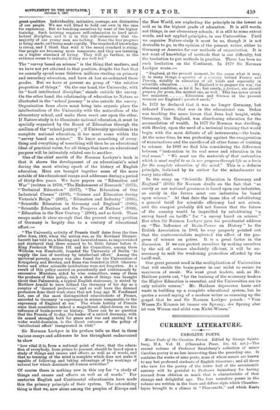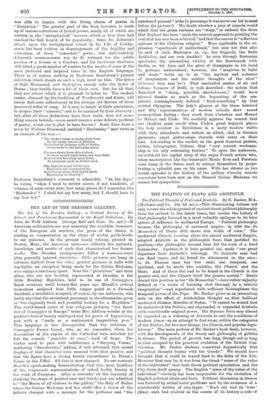C URRENT LITERAT (IRE.
CAROLINE POETS.
Minor Poets of the Caroline Period. Edited by George Saints- bury, M.A. Vol. II. (Clarendon Press. 10s. Gd. net.)—The second volume of Professor Saintsbury's collection of minor Caroline poetry is no less interesting than the preceding one. It contains the works of nine poets, none of whose names are known to any but professed students of English literature; and all those who care for the poetry of the latter half of the seventeenth century will be grateful to Professor Saintsbnry for having rescued from oblivion so much that is characteristic of that strange and delightful age. The four narrative poems in the volume are written in the loose and diffuse style which Chamber. layne brought to a climax in " Pharonnida," and which Keats was able to inspire with the living charm of genius in "Endymion." The greater part of the book, however, is made up of various collections of lyrical poems, nearly all of which are written in the " metaphysical " manner, which at that time had reached the full height of its popularity. Since Dr. Johnson's attack upon the metaphysical school in his Life of Cowley, much has been written in disparagement of the frigidity and contortion of these " conceited " poets ; but unfortunately Johnson's common-sense was no fit tribunal for the subtle passion of a Donne or a Crashaw, and his irrelevant strictures still blind a great number of readers to the merits of some of the most profound and inspired verse in the English language. There is, of course, nothing in Professor Saintsbury's present collection which stands on such a high level as this. The lyrics of Hall, Hammond, and Godolphin merely echo the lyrics of Donne ; they hardly have a life of their own. But for all that, they are echoes which it is pleasant to listen to. The modern reader, obsessed by the tradition of Wordsworth and Keats, will surely find some refreshment in the strange old flavour of these preserved relics of song. It is easy to laugh at their quaintness, to despise their "conceits," and to be annoyed by their obscurity ; but, after all these deductions have been made, does not some- thing remain behind,—some secret essence, some delicate perfume of poetry, which one is glad to have known ? Some lines from a poem by William Hammond entitled " Husbandry " may servo as au example of the rest :— " The broken heart to make clods torn By the sharp arrows of Disdain, Crmnbled by pressing rolls of Scorn,
Gives issue to the springing grain.
Coyness shuts Love into a stove ;
So frost-bound lands their own heat feed: Neglect sits brooding upon Love, As pregnant snow on winter-seed.
The harvest is not till we two Shall into one contracted be ; Love's crop alone cloth richer grow Decreasing to identity."
Professor Saintsbury's comment is admirable. " In the days," he writes, "when I used to review scores, if not hundreds, of volumes of verse every year, how many pieces do I remember like Husbandry' ? I shall not say how many, lest I should have to say how few."































































 Previous page
Previous page